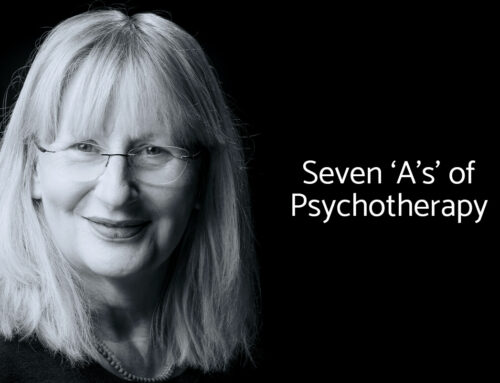I have worked with many people who struggled with personal difficulties they felt they could not overcome – but the problem was not that they could not overcome them, it was that they didn’t know how. They had never learned, anywhere, about how to create a stable, well-functioning, balanced, peaceful and happy mindset that will serve you well in good times and in bad. Yet this knowledge and understanding is available!
Psychotherapy has so many helpful resources to offer, and you have to wonder why such a cynical attitude towards it has developed. Some people believe that learning to understand your own mind and feelings and how you operate is to be discouraged or is self indulgent, and all that matters is the material world outside yourself. You would think education was designed on purpose to confuse you and indoctrinate you in dysfunctional modes of thinking, as you are not taught much that is useful in life.
However, psychotherapy brings a different perspective. Your inner world of values, beliefs, basic unconscious assumptions and your inner dialogue of constantly repeating thoughts is what creates your personal life experience. You can learn to access them, to understand them, and change them, and psychotherapy has many tools and resources for this.
I have worked with many people struggling with:
- anxiety
- stress
- low self esteem
- low sense of value or purpose
- confusion and lack of clear thinking
- difficulty making decisions
- procrastination, low motivation, under-achieving and lack of fulfilment
- believing you are not creative
- believing you are stupid or you lack intelligence
- feeling helpless, disempowered, or that you are unable to improve your life or the problems you see around you
- addictions of all kinds
- lack of kindness and compassion towards yourself
- being overly self sacrificing and dutiful, believing this makes you a good person
- constantly watching the news and media
- increasing difficulties in being able to focus or concentrate or get things done effectively
- communication problems in relationships
- high levels of repeated fear and worry that restrict your life and your opportunities
- lack of free self expression
- a lack of trust or safety in the flow of life itself
- being haunted and controlled by the past – not knowing how to process difficult and traumatic life events and be able to move on
- difficulty managing strong arising emotions such as anger

These are common human difficulties, and when you have been trained in suboptimal ways of operating, you accept them as normal. You may not have questioned hundreds of beliefs, values, behaviours and assumptions that were ingrained in you by your mid-teens. Parents have an enormous power to influence you when you are very young, and you take for granted that everything they say and do must be right and is in your own best interests. But often your parents themselves were working on the basis of what they had been taught, and they believed it was the right way to be. This is the process of social and religious conditioning.
“My mother always said we had too much work to do to dawdle and look at the flowers”
“We never talked about feelings, it was as if they didn’t exist. I felt ashamed and confused about my emotional reactions and I learned to suppress them. Now I can’t control my anger”
“We learned we had to follow his authority without question, and what we thought didn’t matter. Now I have difficulty making my own decisions because I always feel I am going down the wrong road”
“I was terrified I had to do exactly what they said, or they would abandon me or ostracise me, I was always trying to work out what I was doing wrong so they would approve of me”
“I always wanted to go to art college but they insisted I followed in my father’s footsteps, and I’ve always felt like a failure because I was never any good at anything”
There are also societal beliefs and assumptions that are commonly understood and repeated, and everyone has been exposed to them:
- earning a living has to be drudgery and not enjoyable
- we live in fear of what other people think
- constant self-criticism and low self worth is the norm
- tall poppy syndrome – you can’t be excellent in your own unique way, or you will stand out and someone will cut you down
- your own personal needs and values are insignificant, and if you were a good person you would sacrifice your wellbeing for other people’s needs that are more important than your own
- gossip, criticism, making judgements, backbiting and dishonest communication are normal and you have to join in
- you have to accept corruption, bullying, unfairness and exploitation and keep your head down and act like you don’t see it
- saying no to things you don’t believe in will get you in trouble
- you are powerless to change anything
- you are a victim of the world you see around you
- creativity is trivial and unnecessary
- showing your feelings makes you vulnerable
- you have to decide what you want to do when you are young and then stick with it forever
New life skills and understanding, delivered in a warm and friendly one-to-one relationship
Psychotherapy is a way of retraining your mind to be able to think for yourself, and to explore and challenge negative thinking, stuck feelings and repeating difficulties in relationships. It is about learning how to be truly resilient, flexible and courageous. It teaches you that your emotions are an important doorway to your wellbeing, but you need to understand and interpret them right. Psychotherapy offers you keys to understanding the internal operating system of your mind, both conscious and subconscious, so that you can exercise free choice about how you want to feel and think. It helps you understand how different aspects of your mind are in conflict, how this limits your effectiveness and wellbeing, and how you can align with mindful, positive and constructive thinking. Do you need psychotherapy to achieve this? Not necessarily, but you do need some form of guidance and support, especially in the early stages, as changing all of this on your own can be confusing and overwhelming. A psychotherapist has an understanding of this territory and can be the catalyst to help you make the changes you need to make, in a friendly and manageable way. People often say things such as “I never looked at it that way before”, “I never thought I could change”, and “why isn’t this taught at school?”
Please text me on 07825284160 or email me if you would like to discuss the changes you want to make in your life, and how I might be able to help you make them.




